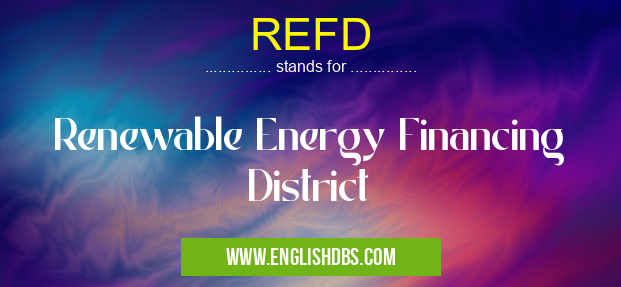What does REFD mean in ENERGY
REFD stands for Renewable Energy Financing District. It is a special district created under California law to finance renewable energy projects. REFDs are typically formed by local governments, but they can also be formed by private entities.

REFD meaning in Energy in Governmental
REFD mostly used in an acronym Energy in Category Governmental that means Renewable Energy Financing District
Shorthand: REFD,
Full Form: Renewable Energy Financing District
For more information of "Renewable Energy Financing District", see the section below.
» Governmental » Energy
Purpose of REFDs
REFDs are designed to provide low-cost financing for renewable energy projects. This can help to reduce the cost of renewable energy and make it more affordable for businesses and homeowners. REFDs can also help to promote economic development and create jobs in the renewable energy sector.
How REFDs Work
REFDs issue bonds to raise money for renewable energy projects. These bonds are typically tax-exempt, which makes them more attractive to investors. The proceeds from the bonds are then used to finance renewable energy projects in the REFD's jurisdiction.
REFDs can also provide other types of financial assistance to renewable energy projects, such as grants and loans. This can help to reduce the upfront costs of renewable energy projects and make them more feasible.
Benefits of REFDs
REFDs offer a number of benefits, including:
- Lower cost of renewable energy: REFDs can help to reduce the cost of renewable energy by providing low-cost financing for renewable energy projects.
- Increased access to renewable energy: REFDs can help to make renewable energy more affordable for businesses and homeowners, which can lead to increased adoption of renewable energy.
- Economic development: REFDs can help to promote economic development by creating jobs in the renewable energy sector.
- Environmental benefits: REFDs can help to reduce greenhouse gas emissions by promoting the use of renewable energy.
Essential Questions and Answers on Renewable Energy Financing District in "GOVERNMENTAL»ENERGY"
What is a Renewable Energy Financing District (REFD)?
A Renewable Energy Financing District (REFD) is a designated area where property owners can voluntarily finance renewable energy projects through special assessments on their property taxes. These assessments are used to cover the costs of installing and maintaining renewable energy systems, such as solar panels or geothermal heat pumps.
How are REFDs funded?
REFDs are funded through special assessments on property taxes within the designated area. Property owners who choose to participate in the REFD agree to have an additional assessment added to their property tax bill. These assessments are used to cover the costs of installing and maintaining renewable energy systems.
What types of projects are eligible for REFD funding?
REFD funding can be used to finance a wide range of renewable energy projects, including solar panels, wind turbines, geothermal heat pumps, and biomass systems. The specific types of projects eligible for funding vary from state to state.
How do I know if my property is located in a REFD?
To determine if your property is located in a REFD, you can contact your local government or visit the county assessor's website. The county assessor's website will typically have a map of the REFDs within the county.
How much does it cost to participate in a REFD?
The cost of participating in a REFD varies depending on the size and scope of the project. The special assessment on your property tax bill will be based on the cost of the project and the amount of energy you are expected to generate.
Are there any tax benefits to participating in a REFD?
Yes, there are a number of tax benefits to participating in a REFD. Property owners who install renewable energy systems through a REFD may be eligible for federal and state tax credits. Additionally, some states offer property tax exemptions for renewable energy systems.
Final Words: REFDs are a valuable tool for financing renewable energy projects. They can help to reduce the cost of renewable energy, increase access to renewable energy, and promote economic development.
